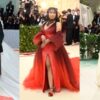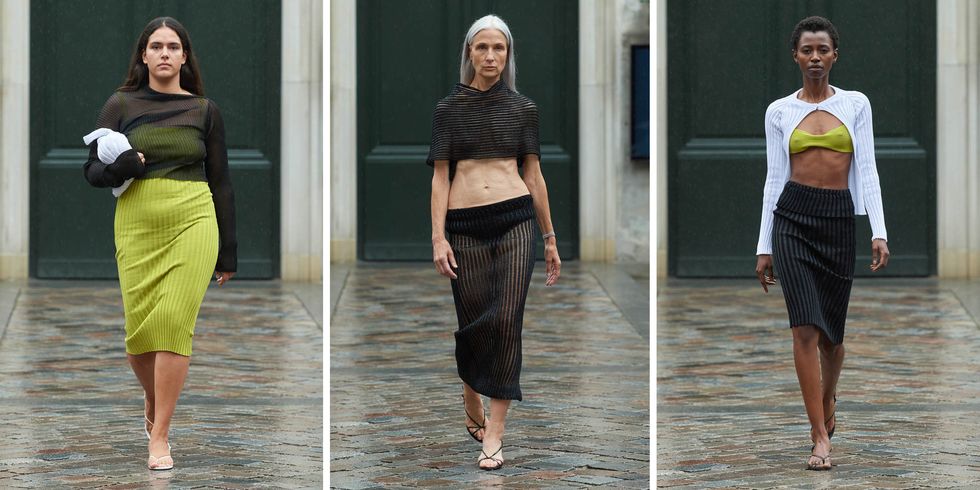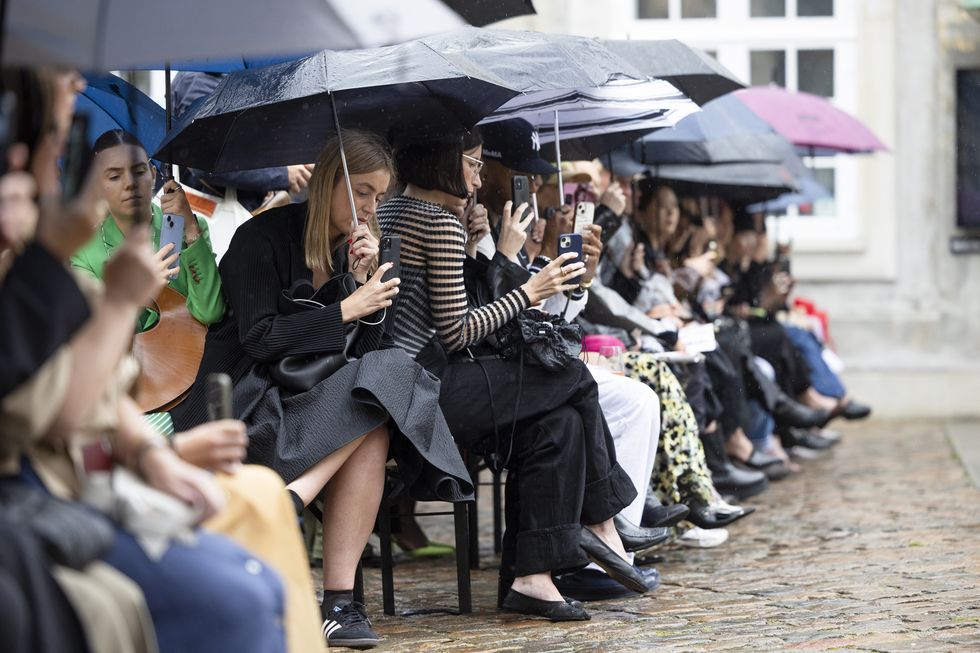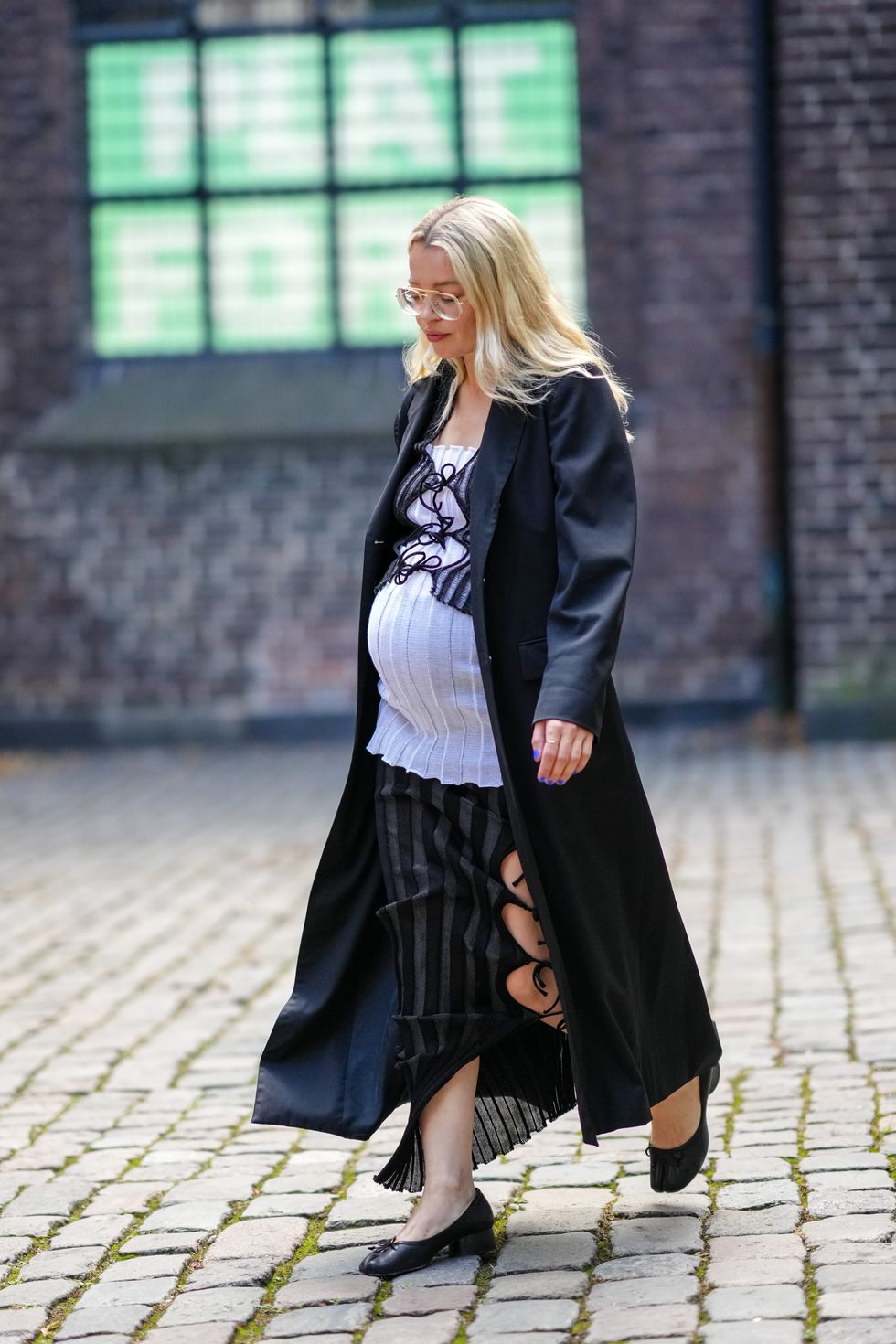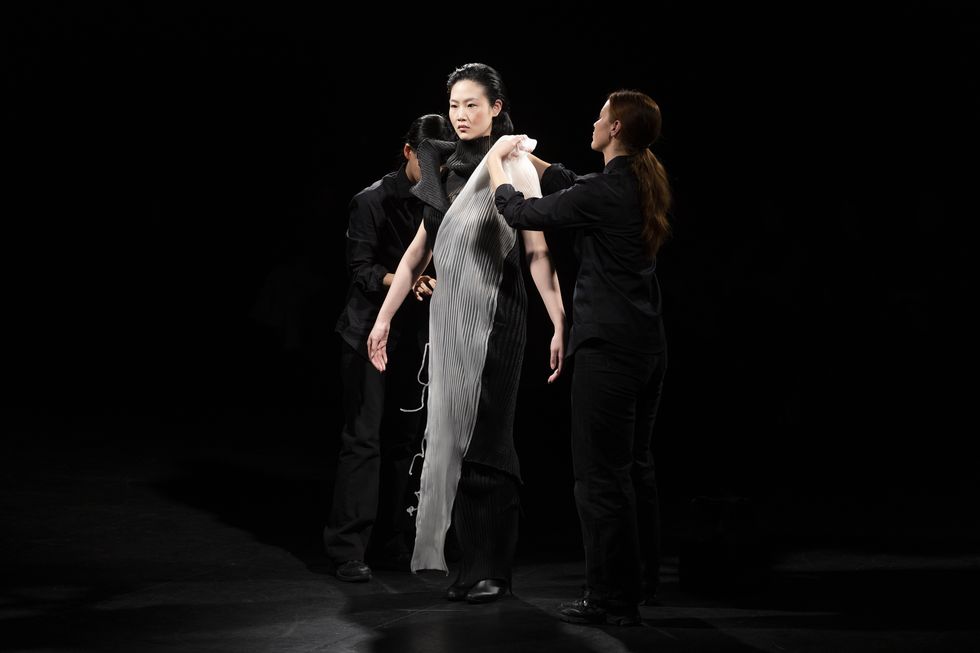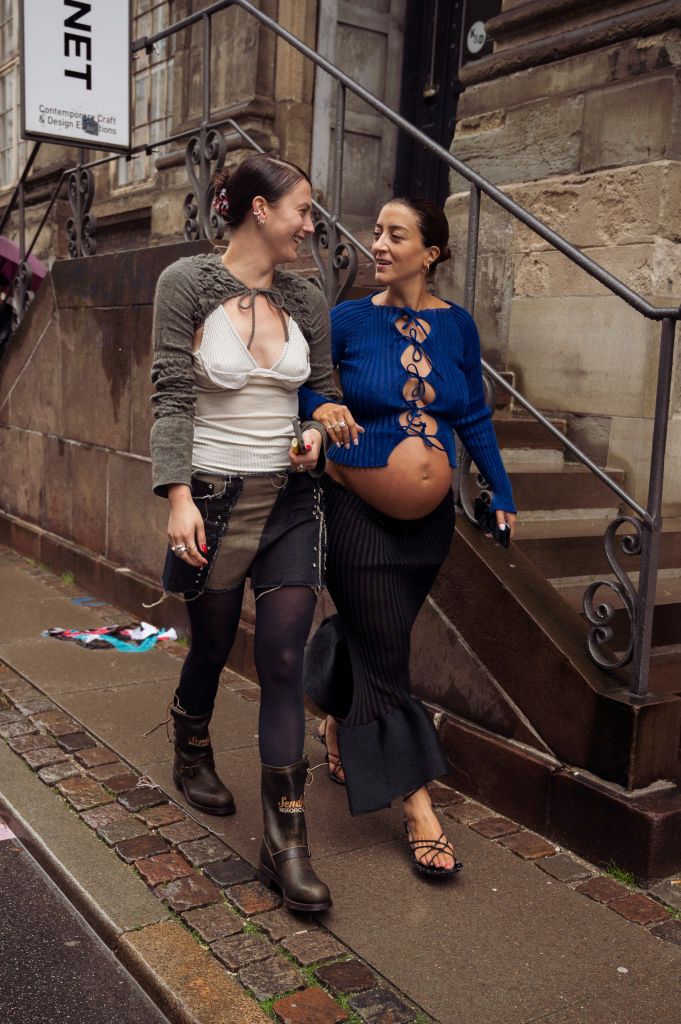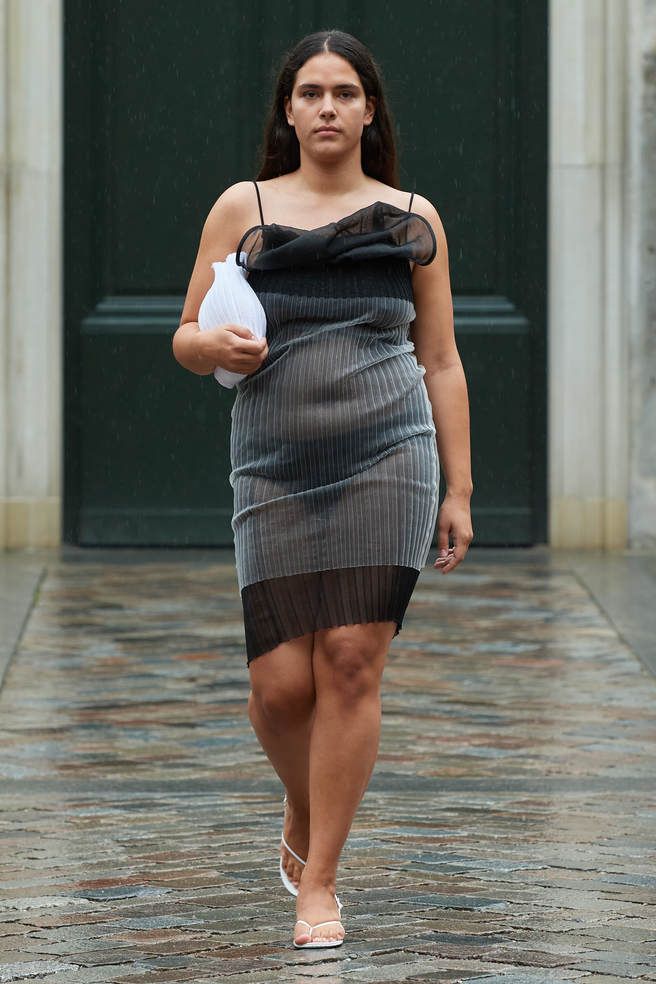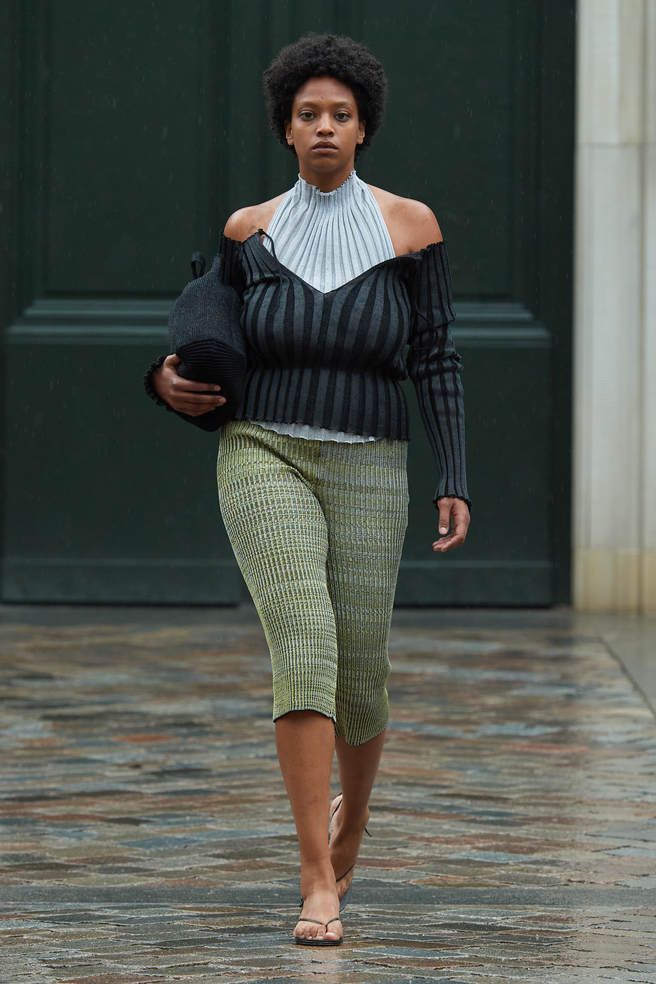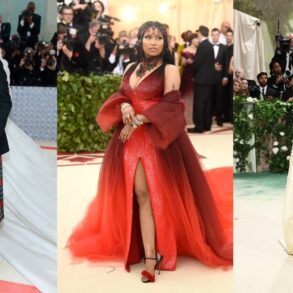A. Roege Hove, which opened the calendar at Copenhagen Fashion Week for spring/summer 2024, is billed as a “conceptual knitwear brand.” The phrase’s intellectual posturing made me wonder: How does a sweater get elevated into a concept? But then I encountered the women who layer and twist designer Amalie Røge Hove’s pieces into their wardrobes—and it all made sense.
Stephanie Broek, a fashion writer and consultant, planned to wear an A. Roege Hove dress to this week’s programming in the Danish capital. Two years ago, before she attended the label’s first runway show in 2021, she was curious about the brand’s peculiar knitted fabric: It can hold its shape in the form of a single, zero-cut garment, but still stretch to fit a variety of body types.
After the first show, Broek said these knits were the talk of the season, and soon after, she wore the line herself. “Amalie has a very distinctive style,” Broek told me. “You’re able to recognize her work after seeing it once. That’s how unique her knitted pleats are.”
At A. Roege Hove, knitwear is never loose and almost always sheer. With wavelike collars and swooping necklines formed from knitted pleats, it often undulates in unexpected directions. Felicia Pennant, editor in chief and founder of online zine Season, owns two A. Roege Hove pieces so far: an icy blue one-shoulder top with a high neck and a black tank midi dress. They make her feel original, she said, because the brand hasn’t yet hit “everyone’s wearing it” status. “They’re definitely trophy pieces,” Pennant told me, “essentially works of art and quite dramatic.”
At the same time, as Broek noted, their stretch makes them innately versatile: Bow-tied cardigans, for instance, can layer over a T-shirt or be worn alone as a going-out top, throughout different stages of life. Broek wore a full A. Roege Hove look to Fashion Week last year while 35 weeks pregnant. “Her designs also make me feel good about my body,” she said. “They emphasize my curves in a beautiful way.”
Word-of-mouth praise from shoppers like these have made A. Roege Hove an insiders’ favorite on the Copenhagen Fashion Week calendar. Before Amalie Røge Hove’s designs were carried by the likes of Farfetch and MatchesFashion, as well as specialty luxury boutiques like New York City’s T.A., she was posting bags she’d woven for herself and her sister on Instagram. She received enough requests to make more, and then expanded into tops, skirts, and dresses. The bags she launched her line with in 2019, after finishing her master’s degree in textile design and working under Cecilie Bahnsen, are still sold by the brand.
Røge Hove told me her goal was always to work on a brand that focused on knits and knits alone. “For me, everything just came from this obsession with textiles and layers and no structures meeting each other,” she said. Her self-fulfilling manipulations of cotton and recycled nylon now have the adoration of both a growing fan base and larger fashion institutions: Earlier this year, the designer won the prestigious Karl Lagerfeld Innovation Award at the Woolmark Prize.
The award, “[gave] so much energy to the team and, in a way, re-confirmed that what we do is valid in a time where making clothes is maybe not valid in itself,” Røge Hove said.
Now, the brand is considering where to take its the momentum it has recently acquired. Collection 10—which debuted yesterday to a crowd of editors, buyers, and fans—stayed true to some of the label’s most recognizable aspects: an emphasis on neutral tones like black and white, several pieces that are entirely sheer, knits that have a striped appearance from their weave.
But indicative of a turning point for the brand, there were also new additions: Some pieces were woven from Circulose, a material entirely formed from textile waste; others had silver embellishments alluding to an upcoming collaboration with Danish jeweler Georg Jensen. “New textures and styles show both more of what knit can do, but also what we as a brand can do,” Røge Hove explained. “In that sense, for this show, we’ve been trying to work [with shapes] that have maybe a more tailored look.”
A question defining the overall attitude pointed back toward clients wearing Røge Hove’s designs out in the real world: “How could we make this a little bit like people on the street in our clothes, in a way?”
After all, while the designer and her team are the first to weave with a new textile or twist a fabric into a new shape, it’s the people outside the atelier who bring the brand to life. “They kind of dare to use it in a different way than we show it in the show,” Røge Hove said. “I like this feeling that if you have a piece that you can use for different purposes, through time, you can style it in different ways.”
Models in Monday’s show tiptoed in high heels through puddles in a museum courtyard refashioned as a cobblestone runway, to a soundtrack of cosmopolitan sirens and honking horns (arranged by the designer) and rain pouring onto the crowd (arranged by the planet). Some runway looks weren’t quite suited for a summer deluge, like a papery translucent tank paired with an equally see-through midi skirt and flip-flops.
The runway looks involving several layers—like a three-quarter sleeve black top opening like the shell in The Birth of Venus to reveal a second gray tank top, or an acid-green dress topped with a mesh, long-sleeved crop—were easier to imagine on a busy city street at the height of summer. They spoke to the qualities A. Roege Hove’s shoppers discussed with me: visually interesting, yet versatile.
I exited the show behind a pair of friends, one of whom was pregnant and wearing a tie-front cardigan and skirt by the brand. They posed for a street-style photographer as a light rain fell, giggling the whole time.
It felt like a snapshot of all the things A. Roege Hove’s knitwear can be: sculptural, daring, a little revealing—and most of all, lived in.

Fashion Commerce Editor
Halie LeSavage is the fashion commerce editor at Harper’s BAZAAR. Her style reporting covers everything from reviewing the best designer products to profiling emerging brands and designers. Previously, she was the founding retail writer at Morning Brew and a fashion associate at Glamour.
This post was originally published on this site be sure to check out more of their content.

